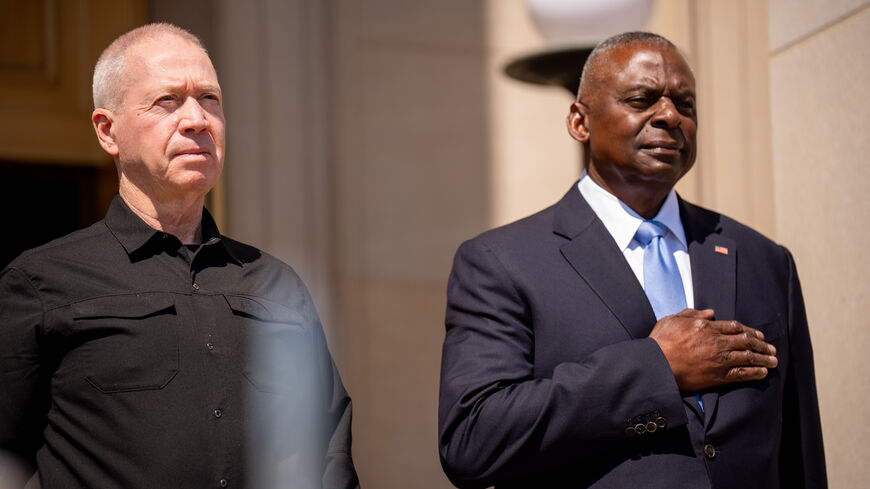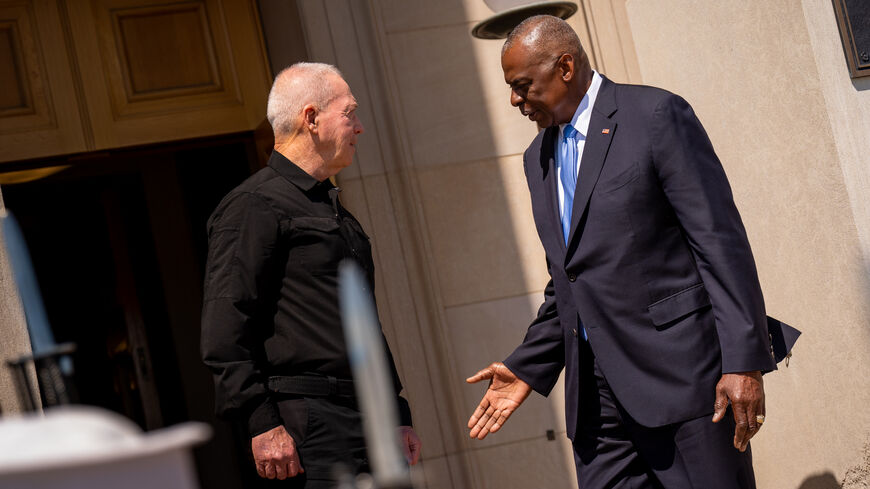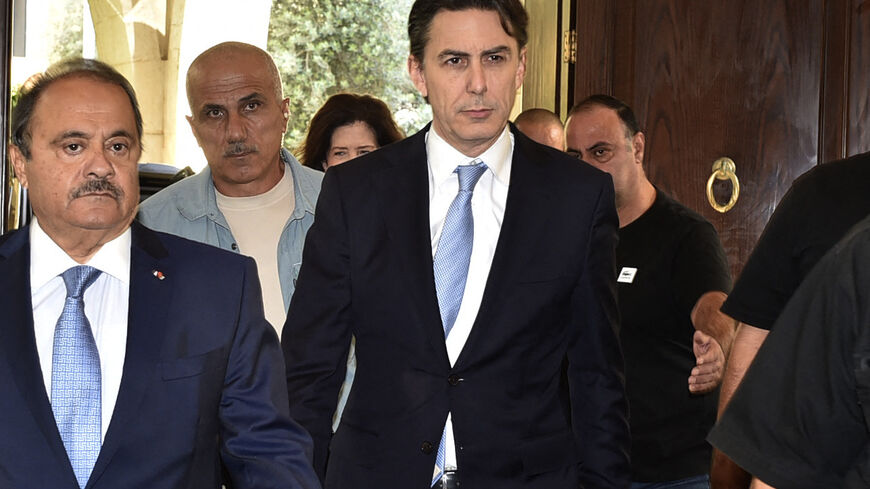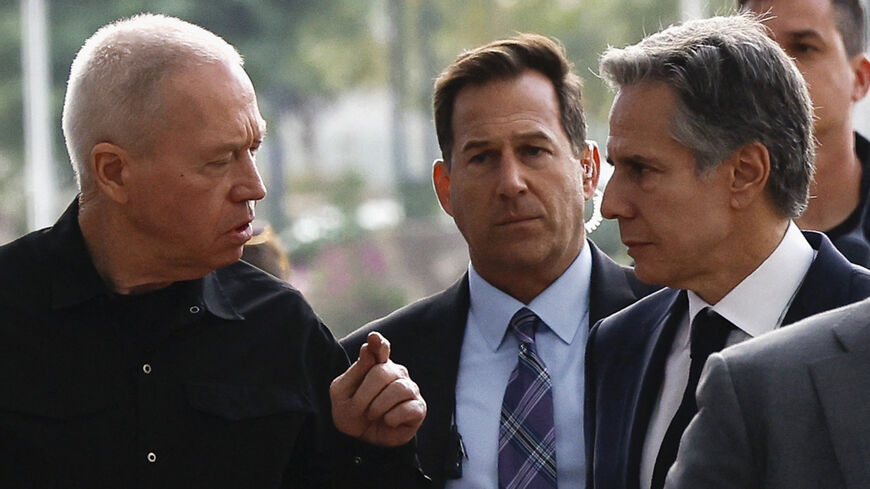Israel’s Gallant in US as Netanyahu hints at moving Gaza troops to Lebanon border
Israel's Defense Minister Yoav Gallant is in Washington to ensure arms are delivered as war looms on the border with Lebanon.

Israeli Defense Minister Yoav Gallant met Monday in Washington with US envoy Amos Hochstein to discuss rising tensions on the Lebanon border as exchanges of fire continue between the Israeli military and Hezbollah and as Prime Minister Benjamin Netanyahu warned that Israel could shift troops from Gaza to the north of the country.
A statement in Hebrew issued by Gallant’s office said the two "continued the dialogue over the actions required from reaching a situation where the [Israeli] residents of the north could go back home." According to the statement, Gallant told Hochstein that "moving to the third phase in the Gaza war would impact all the arenas, and Israel is preparing for every possibility — be it military or diplomatic."
Netanyahu on Sunday had hinted that the military could shift some forces from Gaza to the Lebanon border.
"After the intense phase is finished, we will have the possibility to move part of the forces north. And we will do this, first and foremost for defensive purposes, and second, to bring our [evacuated] residents home," the Israeli premier said in an interview with Channel 14. "If we can, we will do this diplomatically. If not, we will do it another way."
Gallant arrived in Washington on Sunday and is set to meet with Secretary of Defense Lloyd Austin and other US officials to discuss the security situation in Lebanon and the delivery of arms to Israel.
Ynet reported Monday that a missile launched from Lebanon landed in an open area near the border village of Margaliot, sparking a bush fire. The Israel Defense Forces said Monday morning that fighter jets struck several Hezbollah targets in southern Lebanon overnight Sunday. The strikes came after Hezbollah launched an anti-tank guided missile late Sunday, injuring two members of the security team of the northern community of Metula.
Arriving Sunday evening, Gallant first met with Sen. Lindsey Graham. Gallant wrote afterward on the X platform that he discussed with the senator "the importance of ongoing US support as we work to bring the hostages home, continuing dismantling Hamas capabilities and defend our northern border against Hezbollah."
Gallant will be in Washington until Wednesday, and is scheduled to meet during his visit with Austin, Secretary of State Antony Blinken and CIA Chief William Burns. According to Haaretz, apart from discussing Israeli concerns on delays in deliveries of weapons and ammunition to Israel, Gallant will also discuss with his counterparts efforts advancing a deal for the release of the hostages in Gaza, the situation in Lebanon and the Iranian threat.
Officials in the Israeli security establishment are concerned over the way Netanyahu is managing the crisis. Netanyahu accused the Biden administration last week of halting the delivery of certain arms, an accusation denied by Washington. So far, only one shipment of bombs was delayed over their potential use in Israel's Rafah campaign. The report said that the shipments are essential to Israel's readiness for war with Hezbollah.
Lebanon war becomes more real
IDF Chief of Staff Herzi Halevi said Wednesday that the outbreak of a war in Lebanon is likely. "I don’t know when the war in the north will begin, but I can say that the probability of a war starting in the coming months is high," he told Israeli soldiers near the border. "When needed, we will advance with all our might," he added.
Chairman of the Joint Chiefs of Staff Charles Brown warned Sunday that the United States would not be able to help defend Israel in an all-out war with Hezbollah the same way it stepped in during the Iran drone attack on April 13, the Associated Press reported on Monday. Brown also said that Iran “would be more inclined to support Hezbollah” than it does Hamas in the Gaza Strip, “particularly if they felt that Hezbollah was being significantly threatened.”
Brown explained that one of the reasons it would be difficult for the United States to help protect Israel from Hezbollah is the complexity of intercepting Hezbollah's short-range rockets.
Head of the far-right French party National Rally Jordan Bardella told Al-Monitor Monday that France must continue its efforts in bringing stability to the region. "France’s role has always been to use its means for de-escalation," he said. Asked if France will stand by Israel if Iran attacks the way it did on April 13, when Tehran launched a drone and missile assault, Bardella said, "Yes. Naturally." According to polls, the National Rally is set to become the biggest party in France in the parliamentary elections set for June 30 and July 7. Paris has been deeply engaged in mediation efforts with Hezbollah and has put on the table a proposal for an agreement, so far to no avail.
Netanyahu not ready to end Gaza military operation
Netanyahu said Sunday he is "prepared to make a partial deal" for the release of "some of the hostages" held in Gaza that will allow Israel to continue fighting in the enclave, sparking outrage among relatives of abductees. In a first interview with an Israeli media outlet since Oct. 7, Netanyahu told Channel 14 that the fight against Hamas in the Gaza Strip was coming to an end, but that the war will not end until the group no longer controls the Palestinian enclave.
"I am not willing to end the war and leave Hamas as it is," he said.
Contrary to Netanyahu’s statements, senior figures in the Israeli security establishment would like to see the operation in Rafah finished within a few weeks so the military can focus its efforts on the northern front.
National Unity Knesset member Gadi Eisenkot, who resigned a week ago from the war cabinet, said Monday that Netanyahu must clarify his statement on a "partial deal." Until two weeks ago, in all the discussions that took place inside the war cabinet, there were only two alternatives, said Eisenkot: "Either a deal in one stage — the so-called 'all for everything' — or an overall deal in three stages. The cabinet voted for this unanimously."








